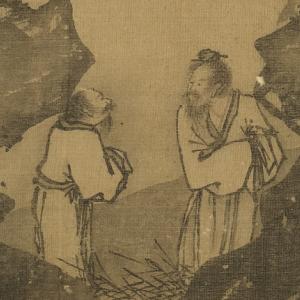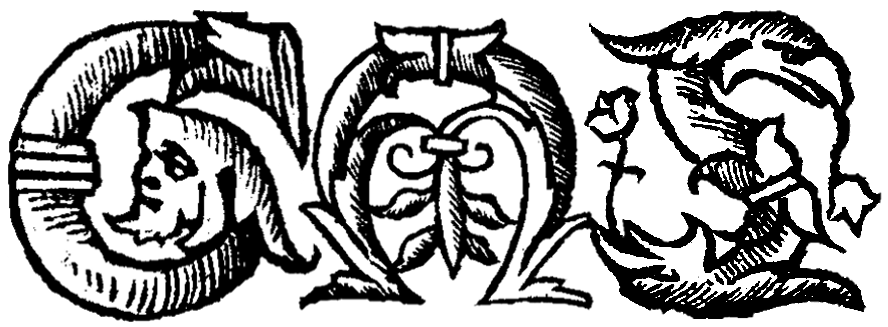To the tune “Spring in the Jade Building”—“Since we parted I do not know how far away you are” | 玉春樓 · 別後不知君遠近

Detail from 宋夏珪真蹟(Two Men Talking) 卷 , 夏珪, National Palace Museum, Accession Number: K2A000996N000000000PAA [Public Domain]
Read the text (PDF)
Introduction to the Text
This song lyric conveys the sorrow of a woman whose faraway lover rarely contacts her. (The fish mentioned in the first stanza is a reference to a legend about a fish bringing a letter from a distant loved one.)The lines convey her desperate sadness at losing touch and her impression that the natural world shares her emotions.
The ci genre of Chinese poetry first emerged in the Sui dynasty (581-619), was further developed in the Tang dynasty (618-907) and matured in the Northern Song dynasty (960-1127). Ci is usually translated into English as “song lyrics”. This is because ci were composed by poets to fit pre-existing tunes. The number of lines, the line lengths, and the tonal and rhythmic patterns of ci vary with the tunes, which number in the hundreds. One common occasion for composing ci would be a banquet: song lyrics would be scribbled down by guests and then sung by musical performers as entertainment. Other occasions for composing and enjoying ci would be more casual: the poet might sing the lyrics to himself at home or while travelling (many ci poets were civil servants of the Imperial Court and often had to travel great distances to carry out their work). Sometimes the lyrics would be sung by ordinary people in the same way as folk songs. This oral and musical quality sets it apart from other genres of poetry in China during the same period, which were largely written
texts with more elevated objectives. There are two main types of ci : wǎnyuē (婉 约, “graceful”) and háofàng (豪放, “bold”). The wǎnyuē subgenre primarily focuses on emotion and many of its lyrics are about courtship and love, while the háofàng subgenre often deals with themes that were considered more profound by contemporary audiences, such as ageing and mortality, or the rewards and disappointments of public service.
Ouyang Xiu was a highly influential politician, scholar, and historian of the Northern Song dynasty. He was revered as a grand master of literature and philosophy, and it is not an exaggeration to say that he laid the foundation for the literati mentality of the dynasty. When Ouyang was four years old, the death of his father, a fifty-seven-year-old military officer, left the family destitute. Poverty did not stop Ouyang’s passion for reading: he would borrow books from his neighbors and make copies in order to study them further. Later, he became a bureaucrat and was posted to many cities as a prefect of the imperial court. In his political life, he was principled and solemn, and wrote a great deal in many genres. Much of his writing reflects his dignified character. His song lyrics, however, provide an interesting contrast. Their content may be drawn in part from the colorful private life he enjoyed in his younger years, including liaisons with many different courtesans. Interestingly, they are often written from the perspective of a lovelorn courtesan abandoned by an inconstant lover, in effect casting himself as the villain.
About this Edition
The original text of this ci is based on the edition by Tang Guizhang 唐圭璋 ( Quan Song Ci 全宋詞, vol 1. Beijing: Zhonghua shu ju, 1965). Punctuation follows the edition. Since ci poetry rarely includes personal pronouns, and gender-differentiated pronouns did not exist in Classical Chinese of this period, the gender of the speaker as well as their perspective (e.g. first-, second- or third-person) must often be deduced by the translator from context.
Further Reading
Chang, Kang-i Sun. The Evolution of Tz’u Poetry: from Late Tang to Northern Sung. Princeton UP, 1980.
- A standard survey of the early history of Chinese song lyrics (romanized as both ci and tz’u).
Egan, Ronald. “The Song Lyric”. The Cambridge History of Chinese Literature, vol. 1, edited by Stephen Owen, Cambridge UP, 2010, pp. 434-452.
- An overview of the genre.
Owen, Stephen. Just a Song: Chinese Lyrics from the Eleventh and Early Twelfth Centuries. Asia Center, Harvard UP, 2019.
- A recent new history of the genre.
Tang, Guizhang 唐圭璋, editor. Quan Song Ci 全宋詞. Zhonghua shu ju, 1965. 5 vols.
- A comprehensive edition of ci from the Song dynasty and the source text for the ci in this collection (introductions and annotations are in Chinese).
To the tune “Spring in the Jade Building”—“Since we parted I do not know how far away you are” | 玉樓春 · 別後不知君遠近
玉樓春
別後不知君遠近。
觸目淒涼多少悶。
漸行漸遠漸無書,
水闊魚沉何處問。
夜深風竹敲秋韻。
萬葉千聲皆是恨。
故欹單枕夢中尋,
夢又不成燈又燼。
To the tune “Spring in the Jade Building”
Since we parted I do not know how far away you are,
Whatever meets my eye looks desolate, so much sadness!
The longer we are apart, the further away you are, the fewer letters sent.
The water is wide and the fish has sunk, where can I ask about you?
5 The night is late, the wind-blown bamboos strike the autumn rhyme.
In the thousand notes made by tens of thousands of leaves, there is nothing but regret.
Thus I lean onto the lonesome pillow to search for you in my dream,
Yet the dream does not come and the lamp is burnt out.
Critical Notes
Line 4: “The fish has sunk” is a common idiom to express a lack of communication
Line 5: This refers to “The Sound of Autumn”, a famous song for the erhu, a traditional Chinese string instrument.
